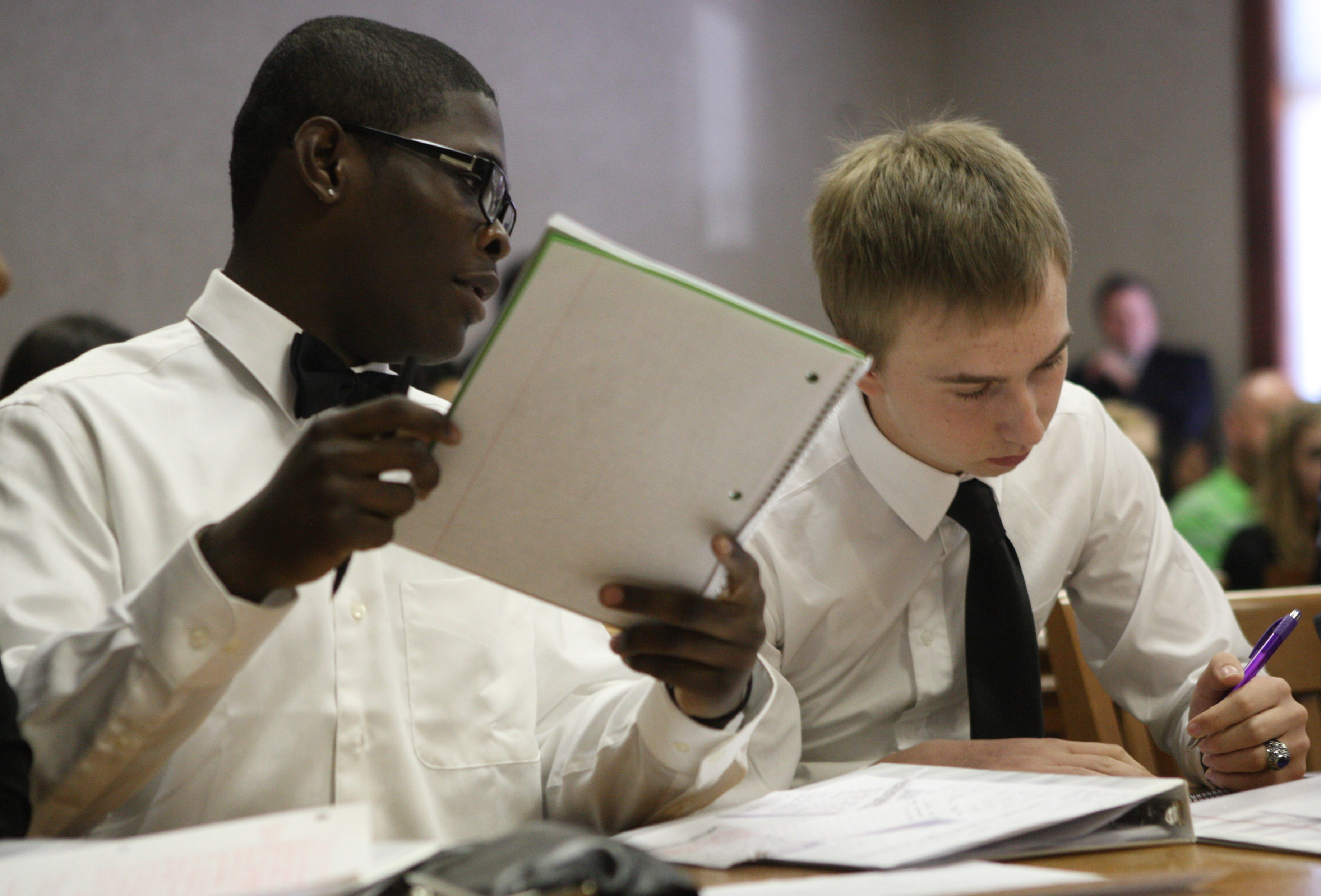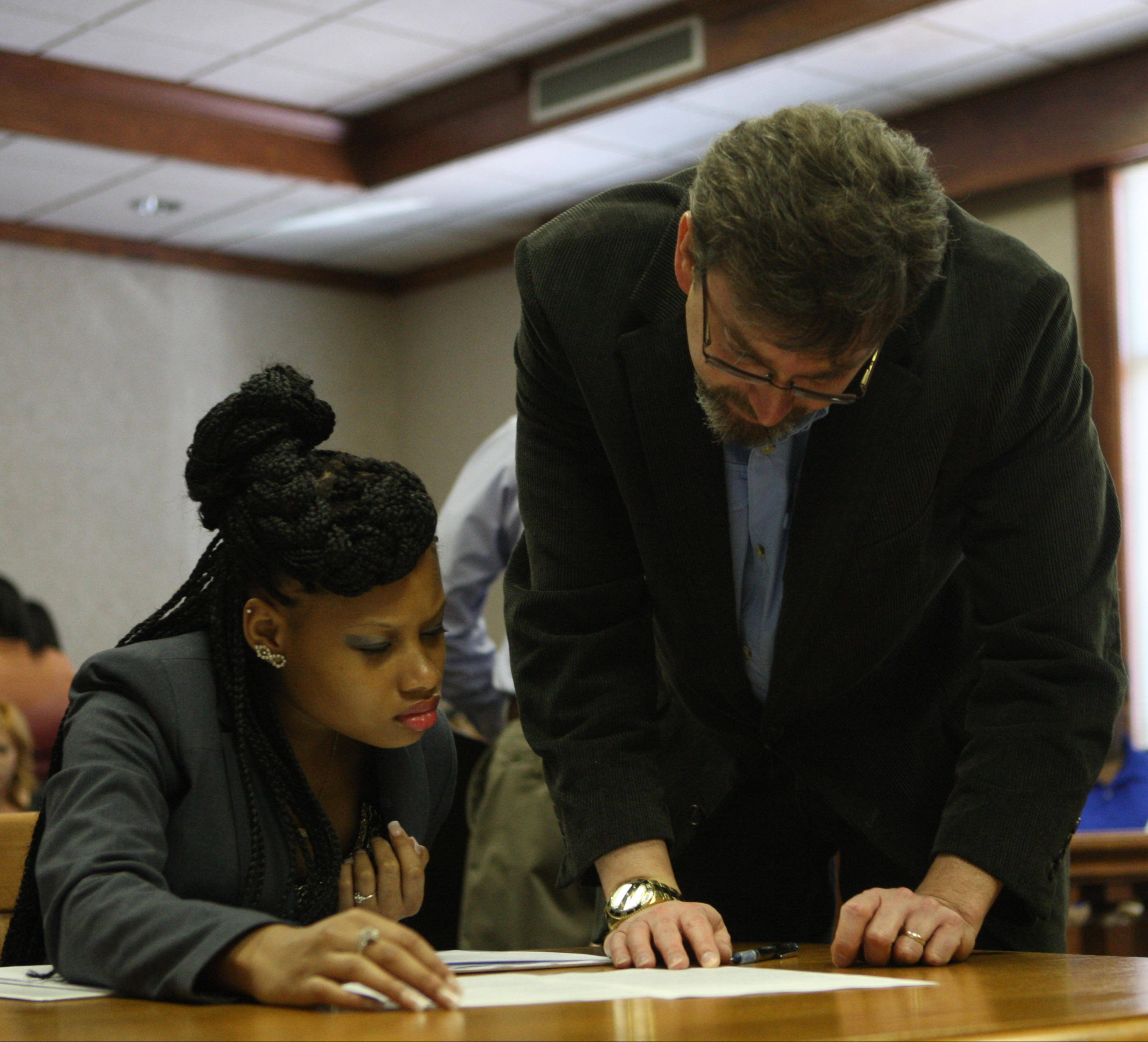By next month a group of teenage boys and girls in Hamilton County will help decide the fate of some of their peers who've broken the law. On Sunday, they got a practice round.
Seated at opposing tables in Hamilton County Juvenile Court, teams of high school students whispered to each other as the room filled with a jury panel and more than 60 family, friends, court personnel and supporters.
Forty students from four area schools were selected for their leadership ability or potential to participate in the county's first-ever youth court.
In Sunday's practice case Jasmine Jones, a 17-year-old junior at Tyner Academy, played the role of the "respondent," the term used instead of defendant.
Her character's name was Evelyn Doe, a teenage girl who'd been caught driving after curfew with an open container of alcohol.
Jones threw herself into the role, rolling her eyes and sighing loudly on the witness stand while being questioned.
Hunter Henry acted as "community advocate," which is the term used instead of prosecutor.
"Do you have a reason for violating curfew?" asked Henry, a 16-year-old East Ridge High School junior.
"No, just having fun," Jones replied, in character as Doe.
After quick rounds of questioning the sides wrapped up with short closing statements.
Shania Douglas, a 17-year-old East Ridge High School junior, closed for the community advocate.
"The respondent needs to realize that this behavior is unacceptable and cannot be tolerated in our community," Douglas told the 23-member jury of teenagers seated before her.
But Jones' defense, or respondent advocate, sought to give the jurors some context.
"Yes, [Jones] has a communication problem, but she is not a menace to society," said Kailey Griffin, a 17-year-old East Ridge High School junior. "We recommend 10 hours of communications training."
Jurors then filed out of the courtroom to deliberate Doe's fate.
When the actual court session begins youth participants will have to swear confidentiality oaths to not divulge anything about the cases they hear. The youth court hearings, like nearly all juvenile court proceedings, are sealed and remain closed to the public.
To be eligible, respondents must first plead guilty to their charges and then agree to allow the youth court to determine their punishment. The court will typically hear nonviolent, low-level offenses, often by first-time offenders.
There are 16 youth courts in Tennessee, said Denise Bentley, who oversees the programs for the Tennessee Bar Association. The oldest continuously operating youth court is in Sumner County and started in 2001.
Bentley said fewer than 7 percent of respondents who participate in Tennessee youth courts re-offend within a year.
The National Association of Youth Courts website shows there are more than 1,050 youth court programs in 49 states as of 2010.
Juvenile Court Judge Robert Philyaw started work on the youth court last summer and reached out to local law firm Miller and Martin as well as attorneys at BlueCross BlueShield of Tennessee to assist.
Miller and Martin partner Randy Wilson said 25 lawyers are volunteering time. Each monthly session will require three attorneys -- one each for prosecution and defense and one to serve as judge.
"We saw this as a way to donate our talents to the youth of the community in what looks to be a very promising program," Wilson said.
Philyaw also contacted four high schools to begin gathering volunteers -- East Ridge High School, Tyner Academy, Lookout Valley High School and Chattanooga School for the Arts and Sciences.
The judge hopes to increase the court members from the 40 who were trained this past weekend to 120.
He aims to have the first actual court session with two cases in April and have a monthly session thereafter. If the program grows to the full 120 volunteers, Philyaw said there could be two monthly sessions.
Back in the courthouse, Philyaw answered jurors' questions as they deliberated Sunday. The jury's decision took just 10 minutes: Evelyn Doe would have to attend 10 hours of communications training, as her advocate recommended.
But a true jury of her peers stacked on an apology letter, traffic school and a 10-page paper on the dangers of driving after curfew.
After the two-hour session, the 40 smiling youths stood for photographs with the judge and other court personnel. Parents snapped their own shots with camera phones.
At the back of the courtroom, Christina Mack stood smiling, watching her daughter Stardasia Harris, a 17-year-old East Ridge High School junior, pose with her cohorts.
The group had spent nearly all of Saturday training before Sunday's mock trial.
"She said it was a long day of training, but 'Mom, I can't discuss it with you but I can tell you to come in and watch me.' And I said OK," Mack said. "I'm very proud of her."
Contact staff writer Todd South at tsouth@timesfreepress.com or 423-757-6347. Follow him on Twitter @tsouthCTFP.


